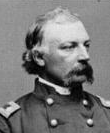 Open main menu
Open main menu
 Open main menu
Open main menu

HDQRS. FORTY-SIXTH REGT. PENNSYLVANIA VOLS.,
Camp near Sandy Hook, Md., September 22, 1862.
The COMMANDING OFFICER,
First Brigade, First division, Banks' Army Corps.
: Colonel Knipe having been assigned to the command of the brigade, it becomes my duty, as second in command, to report the part taken by the Forty-sixth Regiment Pennsylvania Volunteers in the action of the 17th instant near Sharpsburg, Md.
By order of Brigadier-General Mansfield, temporarily commanding the corps, the regiment was ordered to advance to the front about 5.30 o'clock a. m., and was marched into the woods, immediately fronting the position on the enemy, in column of companies, where they were deployed by order of Colonel Knipe into line of battle, and opened a lively fire of musketry upon the enemy. This position was maintained for upward of an hour, the enemy obstinately holding his ground in a corn-field fronting the woods, when Colonel Knipe ordered the regiments to advance. This order was obeyed with alacrity, the regiment advancing to the edge of the field occupied by the enemy, and pouring into their ranks at every step fire so well directed that, if well supported, would have compelled the enemy to give way. But this support was not given and, in consequence, the regiment was compelled to retire some 200 or 300 yards, where they met re-enforcements hastening to the front. The One hundred and twenty-eighth Pennsylvania Volunteers, a new and untried regiment, was brought to our right in column of companies closed in mass. They had no sooner arrived in the field than their colonel fell, and their lieutenant-colonel was so severely wounded that he had to be carried to the rear. Colonel Knipe assisted Major Wanner, the remaining field officer, in deploying the regiment, and it, with other regiments, including the Forty-sixth, advanced and drove the enemy out of the corn-field over another, in clover, into woods beyond both.
After this was accomplished there was a pause of about a half hour in the battle, with the exception of the artillery firing. A brigade advanced about this time out of the woods to our left, and passing us, pressed into those on our right, where they engaged the enemy, but were compelled to retire in about fifteen minutes in great confusion. They rushed past the regiments composing Crawford's brigade, and imparted, to a great degree, the alarm which they themselves felt to some of these regiments, which joined int their flight. The situation was most critical. A battery - a regular one, I think - was wheeled into position on the crest of the slope dividing the two skirts of woods, and opened a tremendous fire of grape and canister upon the pursuing foe. No infantry at the time supported this battery. Colonel Knipe with his colors and a small fragment of this regiment were all that showed any organization in the neighborhood. Some general (name unknown) entreated him to rally what he could of the retreating regiments around his standards and save the battery. This he succeeded in doing, the One hundred and seventh New York responding to this entreaties and forming on his colors. Other regiments, seeing the posture of affairs, regained their confidence and returned to the field. The battery was saved, the enemy retreading to the woods, and the battle, as far as infantry was concerned, on this part of the field, ended. By direction of General Williams, the regiment - what was left of it - retired to the rear to enjoy that rest of which they were so much in need.
Herewith is forwarded a list of the casualties of the day - the killed, wounded, and missing. Among the former it grieves me to mention the name of Captain George A. Brooks. A nobler man, a truer friend, a braver soldier, has not yet yielded up his life as a sacrifice to his country's glory.
I am, very respectfully, yours, &c.,
JAS. L. SELFRIDGE,
Lieutenant-Colonel, Commanding Regiment.
Source: OFFICIAL RECORDS: Series 1, Vol 19, Part 1 (Antietam - Serial 27) , Pages 489 - 490